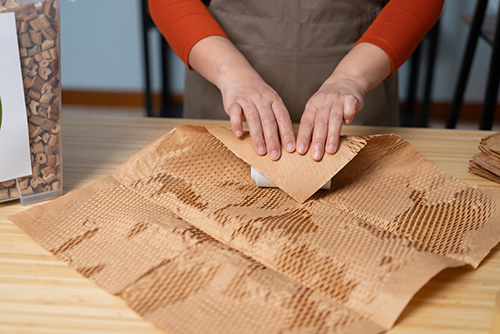
Written by Amara Bennett, Packaging Efficiency Specialist at Pacron
Let’s talk about something that is quickly becoming a make-or-break factor for businesses in our industry today: sustainable packaging
More and more, we’re seeing eco-friendly materials and smarter packaging solutions show up in everything from online orders to retail shelves. This shift isn’t just about looking good — it’s about doing good. And the data backs it up.
According to a recent Shorr Packaging survey, 90% of consumers say they’re more likely to purchase from a brand if its packaging is eco-friendly. That’s not a small number. That’s a major shift in behavior — and one that distributors, retailers, and everyday buyers need to understand.
To put it simply: We’re facing an overwhelming amount of plastic pollution, overflowing landfills, and rising climate concerns. Today’s consumers — especially Millennials and Gen Z — are choosing to support brands that take a stand and make conscious decisions.
But there’s more to it than just saving the planet.
Sustainable packaging taps into something deeper — the need to feel connected to a bigger purpose. When someone supports an environmentally responsible brand, it’s not just a transaction. It’s a choice that says, “I’m part of something greater. I’m doing my part.”
That kind of emotional connection builds loyalty. It builds community. And it builds trust.
Sustainable packaging sends a message. It says:
At its core, sustainable packaging is about minimizing environmental impact. That can include packaging made from recycled, compostable, or biodegradable materials; solutions that reduce volume and weight; and innovations that eliminate the need for plastic altogether.
In recent years, we’ve seen a rise in paper-based alternatives — like expandable honeycomb wraps and curbside-recyclable mailers — that are replacing traditional foam and plastic in a wide range of industries. These options not only help reduce landfill waste, but also create a cleaner, more natural unboxing experience that today’s consumers appreciate.
And when paired with efficient, space-saving dispensers, paper cushioning solutions are also becoming more practical for businesses looking to scale sustainably.
Distributors might not be the face of a brand — but they’re a vital piece of the puzzle. Brands today are under pressure to go green, and they’re looking for partners who can help them get there.
Offering eco-friendly packaging isn’t just a nice-to-have — it’s becoming a business requirement. The distributors who provide sustainable options, educate their clients, and lead the way with innovation are the ones that will stand out.
Simple changes — like offering paper-based protective packaging or sharing information about dispensers like the Hexspenser E™ — can go a long way in helping customers meet their sustainability goals.
For brands and businesses of all sizes, packaging is often the first real moment of physical connection with a customer. It's the first impression — and increasingly, it’s being judged not just on looks, but on values.
Today’s consumers are asking:
“Is this recyclable?”
“Why is there so much plastic?”
“Does this align with what I believe in?”
And when brands can answer those questions with confidence — using packaging that reflects care, thoughtfulness, and sustainability — it creates trust that goes far beyond the box.
Sustainable packaging is more than a passing trend. It’s a reflection of where business, culture, and consumer values are heading.
When 9 out of 10 people say they’re more likely to buy from a brand with eco-friendly packaging, that’s not just feedback — it’s a clear call to evolve.
And while the shift doesn’t happen overnight, every step — whether it’s switching to paper-based cushioning, exploring biodegradable options, or rethinking how orders are packed — moves us all in the right direction.
Because when packaging reflects our shared values, it does more than protect products. It builds trust. It builds community. And it makes people feel part of something bigger.
The planet is watching. So are your customers. Let’s give them something better.